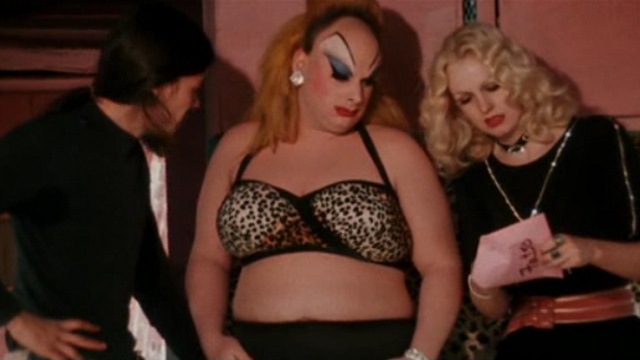Six months ago, almost all critics do a mid-year check-in for a best of and worst of the year so far. But, when we get to the end of the year, the new lists take the whole year into account. By not focusing on the latter six months, critics gives the first half of the year a lot of leniency in best of lists, but are also a bit more strict in their worst of lists. There are enough movies in the second half alone that just reviewing the year in six month chunks is fine by me.
In my run down of the worst of the first half of 2015, the biggest misses were movies that didn’t seem to have much of a reason for existing. Some were movies made of ego meant to be actors showcases (The Water Diviner, Alex of Venice, Mortdecai, The Cobbler), some were morally offensive (The Wedding Ringer, Seventh Son, Me and Earl and The Dying Girl, The Cobbler), some were purely lazy (Zombeavers, The Connection, The Cobbler), and one was just inane (Manglehorn). Almost all of them were forgettably bad (except for you, Mortdecai, I don’t know why you stick in my mind as being egregiously terrible, but you were one of the most tiresome movies of the year) even if they were well deserving of scorn.
The worst of the second half of 2015 has a wider range from merely pointless trifles of awfulness to movies that almost makes one yearn for a giant Volcano to come from under Mulholland Dr. and burn down all of Tinseltown (and, hopefully, Tommy Lee Jones has the day off). In fact, the second half of 2015 had such an awful list of films that I played with the idea of having a budget restriction on the list. That temporary theory posited that any movie that had a budget of $1 million or less was hobbled enough that making the worst of list would feel like kicking a puppy. The only reason I discarded that idea was because it wasn’t in place for the first list. Besides, if a movie with a small budget can make my top ten list, one can certainly qualify for my bottom ten.
Without any further ado, I present: Julius’ Worst 10 films of the second half of 2015.
10. The Hallow
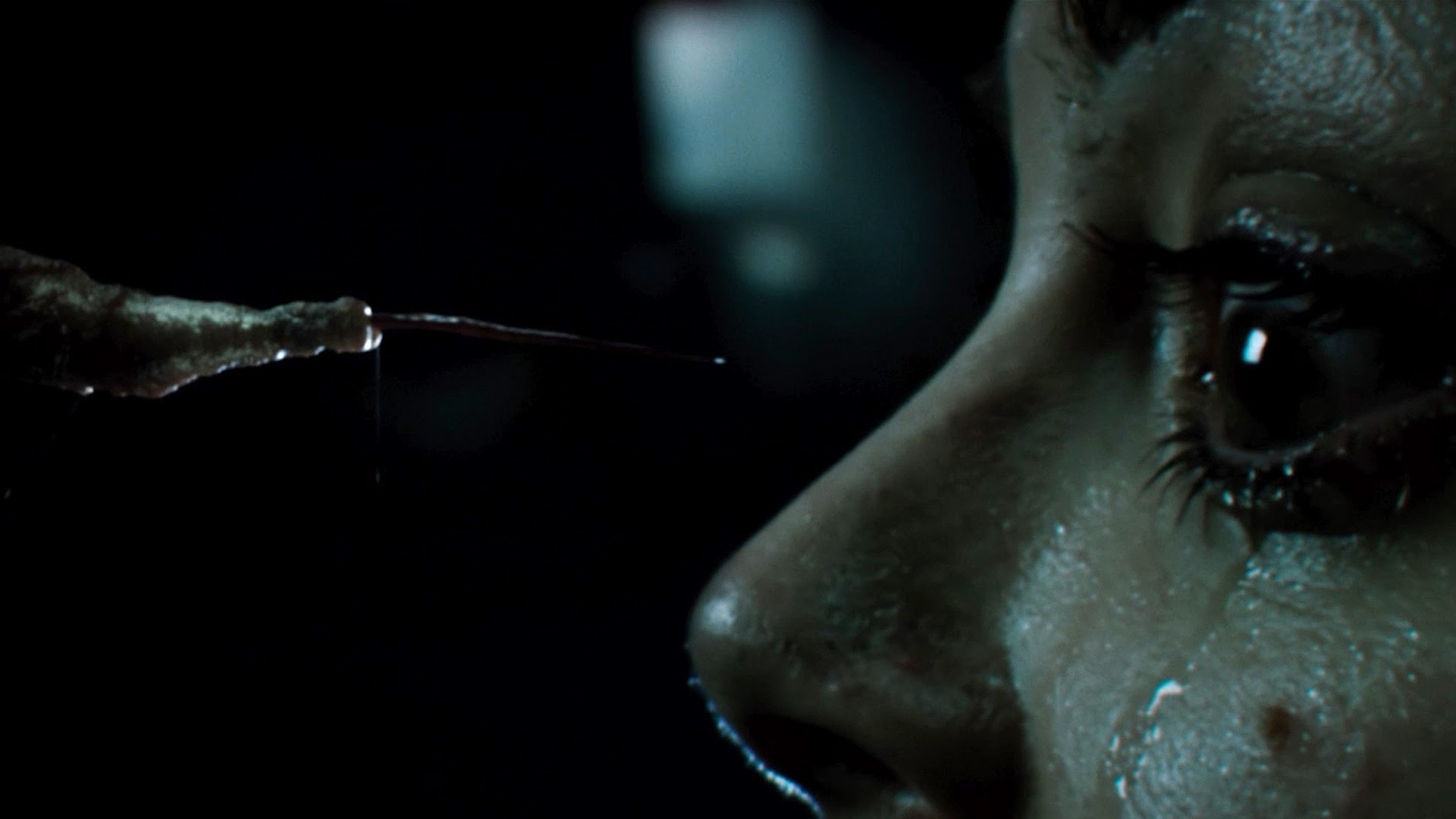
If there’s one thing that horror movies can overcome, it’s budget. By having a non-specific location and using up-and-coming no-name actors, a director can decimate the budget fairly quickly and easily while still maintaining a steady atmosphere of foreboding and dread. The Hallow has the makings of a decent no-budget horror movie, and even has a good spin by using environmentalism as its focal point. A conservationist, his wife, and their new baby move to some forest in Ireland where he is marking trees in a haunted grove that seem to be sick and dying before they can spread their disease to other trees. Unfortunately for him, the fairies of the grove don’t take kindly to that, and decide to exact their revenge…by disabling their car and terrorizing their cabin?
The Hallow takes a good “Cabin in the Woods” formula and promptly does absolutely nothing with it. Well, its one modern twist is that it really enjoys making its audience jump through deafening jump noises, even as the rest of the dialogue seems to be whispered. The characters are poorly drawn, the mythology is poorly concocted and, even at 97 minutes, the movie feels drawn out and over long. Part of the problems stem from The Hallow being Colin Hardy’s first feature length film. Hardy, who has been working in commercial and music videos for years, is best known for being the man chosen to helm the remake of 1994’s The Crow, set to film in 2016. What makes The Hallow hit the bottom of the barrel is Hardy’s utter dependence on formula doesn’t even extend to execution, where his tonality is so wildly haphazard that he frequently neuters all the tension in the scene just as he’s getting to the punchline. Even for a copy of a copy of a copy, Hardy’s debut is poorly paced, constructed, and a waste of a good story.
9. Secret in Their Eyes
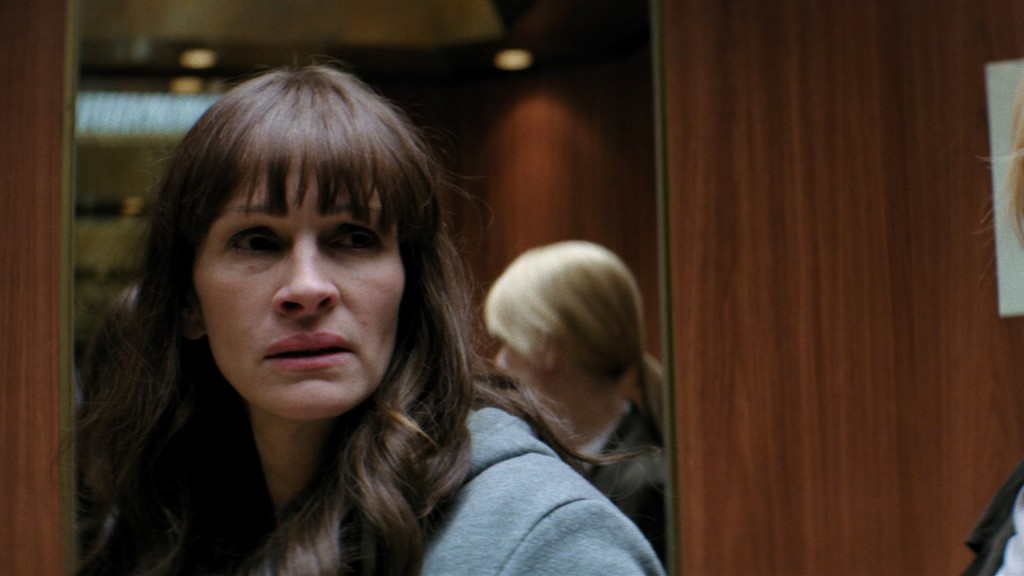
Secret in Their Eyes is a remake of an Argentinian film, which apparently won the Best Foreign Picture Oscar in 2009. Hrmph. Despite not knowing this when viewing the film, Secret in Their Eyes still feels like a Xerox of films I remembered from long ago. The point of reference for much of Secret in Their Eyes isn’t the original Argentinian film, but the big budget American crime films of the late ’90s and the early ’00s, frequently based on novels by James Patterson. In turn, those crime films were stylistic rip offs of David Fincher’s grungy Se7en. While those movies generally presented their crimes with a sense of horror, Secret in Their Eyes is coy enough to almost be bored by the crime it presents.
The story itself is a confused look at our relationship to terrorism, and how our post-9/11 fears eventually caused us to become monsters ourselves. Using a time-jumping story of how an informant murdered the daughter of one of the investigators but is set free because information, Secret in Their Eyes wants to explore how the damage we committed out of fear still haunts us in modern times. With a cast of 3 Oscar-winning actors in the lead – Julia Roberts, Chiwetel Ejiofor, and Nicole Kidman – it’s a shame that the final product looks as staged and phony as the story it concocts. In early scenes, Nicole Kidman actively hits her mark in unnatural ways around a room. Ejiofor actively turns in a performance that is either lazy or bored. Roberts, meanwhile, has a series of unfortunate wigs that is always her personal signature that she’s hiding from a bad movie. Perhaps I shouldn’t have expected much from Billy Ray, the screenwriter of Color of Night, Volcano, and Captain Phillips, but given his Oscar nominations, I thought it had to be better than…this.
8. Scout’s Guide to the Zombie Apocalypse
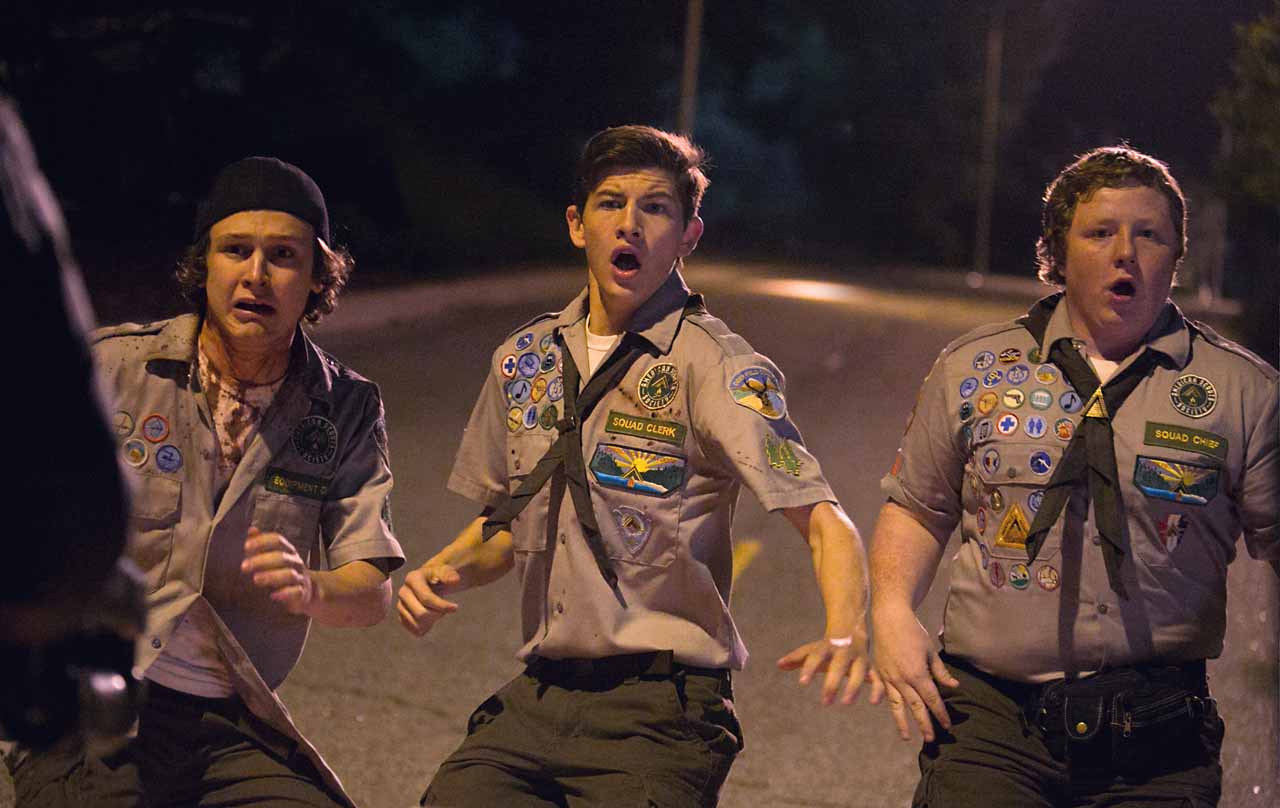
Going in to Scout’s Guide to the Zombie Apocalypse, I expected something of a boy-scout themed rip-off of Zombieland. I expected a movie that would list off scouting rules to help survive an incoming zombie horde. Unfortunately, Scout’s Guide doesn’t even aim for the high concept of its title. It’s perfectly content with having its two lead characters be teenage boy scout geeks, and having them go on a scouting trip on the same night as the senior party and a zombie outbreak. Oh, and having the scout leader be psychotically obsessed with Dolly Parton.
Written and directed by Christopher B. Landon (son of Michael Landon), one wonders…what the hell was he thinking? Co-written by Carrie Evans and Emi Mochizuki (whose only other major credit is Martin Lawrence’s College Road Trip), nobody can figure out what the tone of Scout’s Guide should be. Is it a teenage sex comedy/horror movie, or a parody of the sex comedy and horror genres? Is it trying to be both? In either case, the jokes are largely uninspired and unoriginal, even when we get to the kill scenes which seem largely bent on teen boy “DID YOU SEE THAT?!” shock value than actual comedic content. But, then, Scout’s Guide is a movie that might not know the difference…which might be its biggest downfall.
7. Learning to Drive
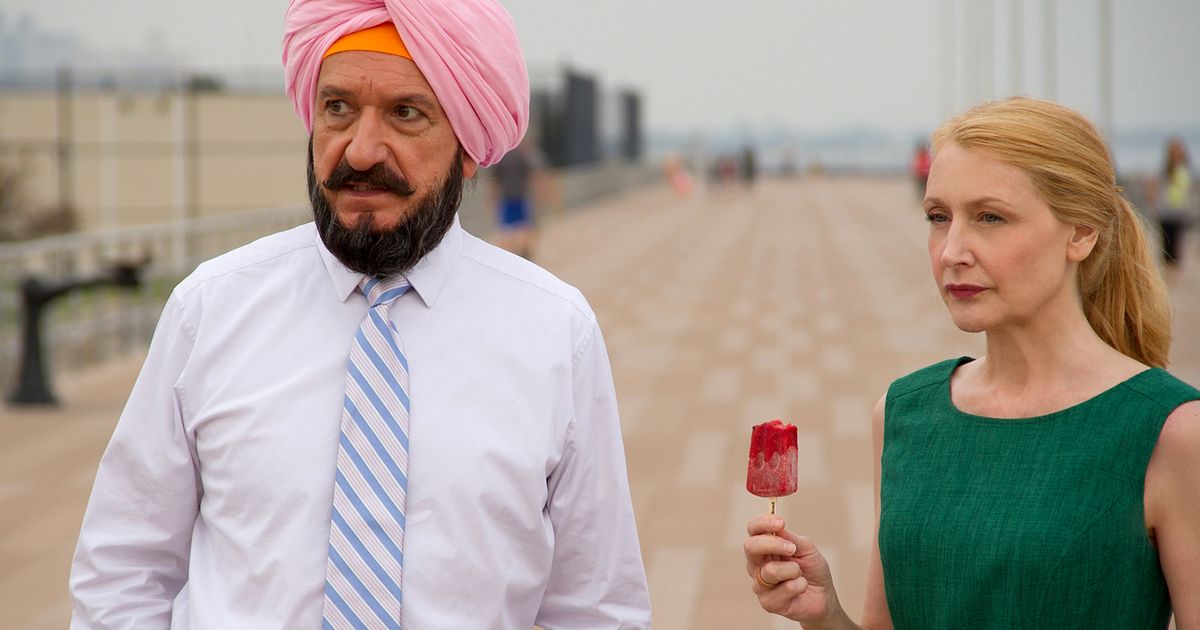
What happens when you give two modern treasures a script with absolutely nothing under the hood? You get this aborted attempt at neutered relationships. Rich white woman Patricia Clarkson is getting divorced after decades of marriage, and is attempting to get her life back together. When her purse is returned by a friendly Indian driving instructor (Ben Kingsley) who refuses to take money for his good deeds, she decides to take driving lessons from him as her “reward.” And, so, they embark on a friendship where she has to deal with her impending unwanted independence, while he deals with his poverty and his impending semi-unwanted arranged marriage.
Even though Learning to Drive is, ostensibly, about the coming together of worlds across race and economic lines, really its about how an impoverished foreign immigrant helps out a rich white lady for money. Essentially, it’s Driving Miss Daisy but without the southern charm or epic time structure, and it carries all of the problems that entails. Outside of the pleasures of watching Clarkson and Kingsley act, there is absolutely nothing going for this movie making it a waste of both talents and their performances.
6. Star Wars Episode VII: The Force Awakens
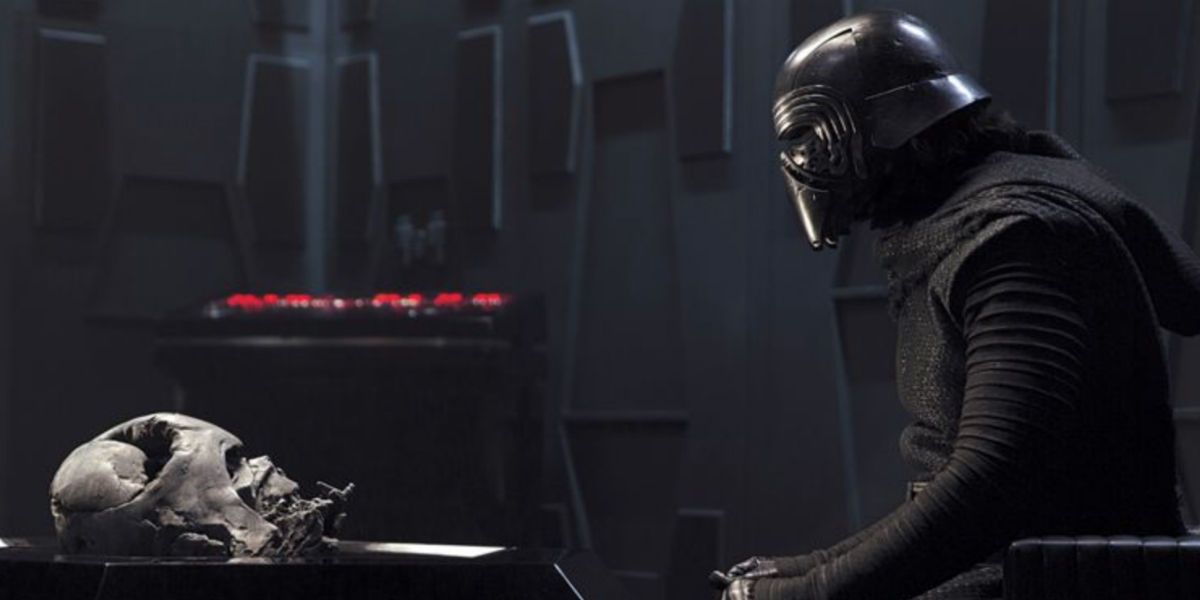
You’ve all been Avatared. The Force Awakens is a bad movie. Strike that, it’s worse than that. It’s a USELESS movie. The main reason people have liked this movie is because the studio hype machine has engineered it so that you can’t not enjoy the movie. The Force Awakens is a rehash of the A New Hope with elements of Empire Strikes Back, Return of the Jedi, and callbacks to the prequel trilogy thrown in for good measure. And, this is a problem. Instead of presenting an original story, or even one that may have relevance to modern concerns, The Force Awakens dishes out the original story but sprinkles it with huge doses of nostalgia, which is like MSG for nerds. Previously, callbacks were about noticing the details in previous installments and being rewarded with a big payoff. Now, they’re mere easter eggs of nostalgia, meant to reward you for noticing meaningless details that have no payoff, but still surround you in the warm and fuzzy feelings of being smart enough to notice the gigantic plot point that had red lights dangling on it saying “NOTICE ME.” The nostalgia leaves you happy and full, not realizing that your brain is being rotted from the inside out. The Force Awakens is filled to the brim with those warm and friendly signs, not leaving much room for characters – Rey is a Mary Jane character, perfect even in her mistakes, and Finn feels like a Firefly character got lost and wandered into the wrong movie – or original ideas (even the Big Bad is a cross between Thanos and The Wizard of Oz).
Perhaps what makes The Force Awakens an excrutiating experience is that J.J. Abrams can’t pull off either the pathos or the dramatics of the original edition. When we reach that certain moment of demise, the primary emotion I felt was boredom. When Abrams blatantly steals from Triumph of the Will to emphasize the Nazi leanings of the First Order (remember: they’re EEEEVIIILLLL), the non-subtlety of his message undermines any seriousness he tried to inflict on the movie. There is not a single solitary moment of genuine emotion in The Force Awakens that isn’t laden with nostalgia of the first time we saw it. The Force Awakens is a pointless, soulless, film whose sole reason for existence is to print money for a large corporation that wants you to pay for more.
5. Unexpected
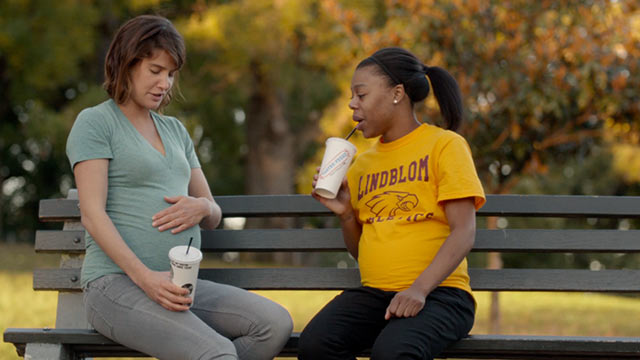
Marking this no-budget personal indie by non-celebrity Kris Swanberg as worse than a soulless mega-blockbuster feels like kicking a puppy. But, good lord, was I angry about this film. I’m still angry 7 months later. This is about a middle-class white teacher working in the slums of Chicago who gets pregnant and bonds with a black teenage student who happened to get pregnant at the same time. Did I say bond? I meant use her as a crutch. Like Me and Earl and the Dying Girl, the white woman at the center of the movie doesn’t actually care about the black girl’s life outside of how the girl’s pregnancy doesn’t fit the mold that the white woman wants for her. Though mildly called out on it, the white woman suffers no repercussions for her invasion and manipulations into this black girl’s life. Similarly, the film doesn’t care about the black girl’s life outside of how it affects the white woman. We only see her home life when the white woman goes to her baby shower, and it’s treated with such alienation that the white woman might as well be going to a party in Iraq. The party is presented as so foreign to her experience, and to the film’s experience, yet it demonstrates no extreme behavior.
The biggest problem with Unexpected is that it’s smug about its progressive attitudes towards black characters. It’s not presenting them as thugs or as troublemakers, but it does this by not treating them as anything. At all. They’re just tools to the white woman’s agenda. If you’re going to be racist, be racist, but don’t pretend like you’re being all progressive about this shit even as you’re othering a whole race with a simple little film like this.
4. Big Stone Gap
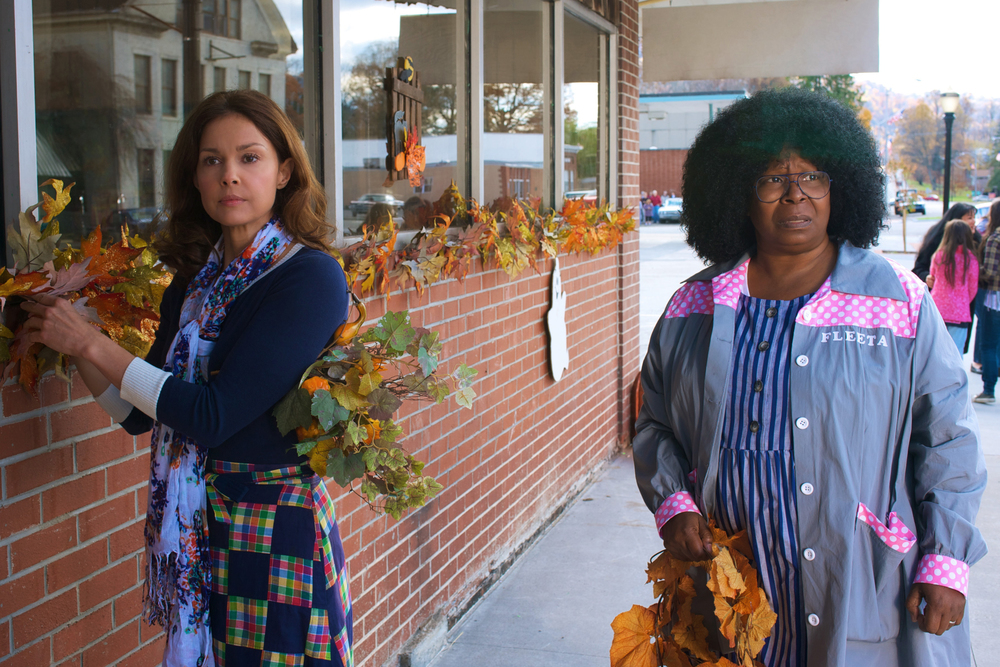
This backwards-as-hell goofy-ass Hallmark-Channel-ready movie would probably be in the “just ignore it” rulebook if it weren’t for the cast. This film somehow stars Patrick Wilson, Ashley Judd, Jane Krakowski, Whoopi Goldberg, Chris Sarandon, Jenna Elfman, Chris Sarandon, Jasmine Guy, Anthony LaPaglia, and John Benjamin Hickey in the same movie. Yet, the best one can say about this movie is that it makes a stellar entry in the “Six Degrees of Kevin Bacon” game. Big Stone Gap is a feel-good nostalgia-laden film that has less logic or sense behind any of its plot points than The Force Awakens.
Ashley Judd is the director of the local town play in a small rust belt-y town in the 1970s. She also owns a drug store, which she inherited from her parents. She’s sued by her dead father’s siblings over the ownership of both her house and drug store because she’s illegitimate and her real father is somewhere in the mountains of Italy? And, she’s been having sex with the lead actor of the play, who also comes out as gay? And, there’s Patrick Wilson who keeps pursuing her because she’s the only non-trampy single woman in town? It only gets worse from there, including a nervous breakdown. On top of that, Big Stone Gap wants to think its being feminist and progressive…but this is a movie where a single woman starts off the voice over and her husband finishes it.
3. Before We Go
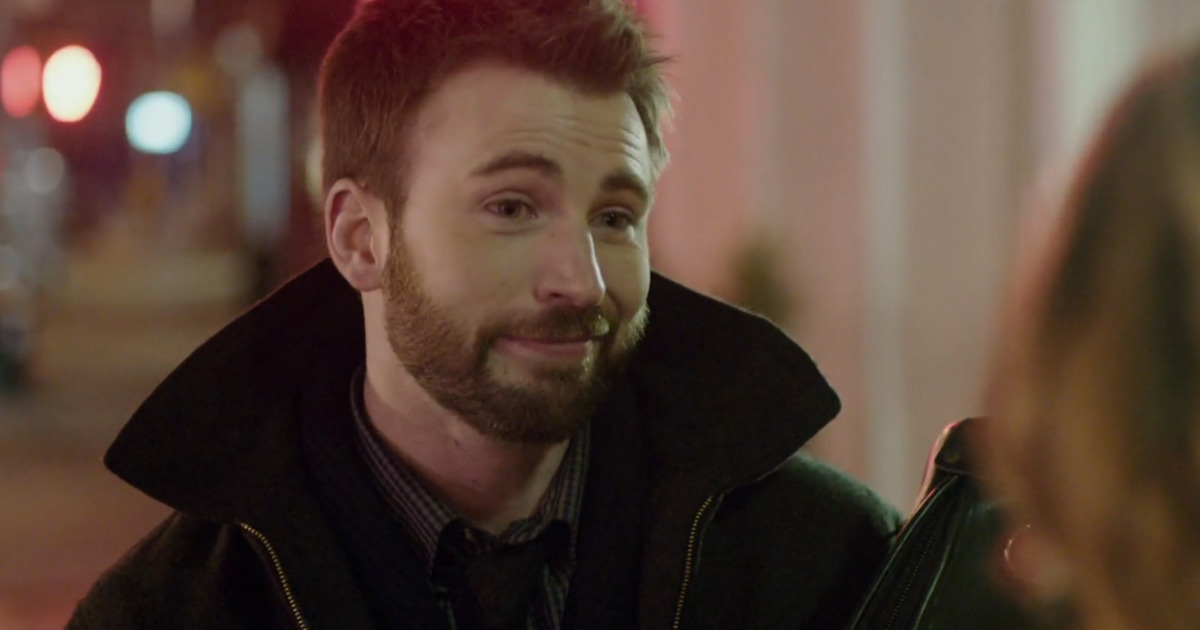
Chris Evans got $3m to make a movie about two people walking in New York City and not falling in love. More offensive than that, Evans plays a broke and broken-hearted jazz musician who seems like he’s never had a bad day in his life. His companion, Alice Eve, can’t act her way out of a paper bag. Together, they make less sense than the plot which can’t decide if it’s a zany After-Hours-esque New York is SO CRAZY movie or a quiet intimate romance. This movie is terrible, pointless, and doesn’t even get Chris Evans’ shirt off. AND IT COST THREE MILLION DOLLARS!!! THAT’S FUCKING OFFENSIVE. Just look at his smug fucking face. Gah. This movie is just awful.
2. The Danish Girl
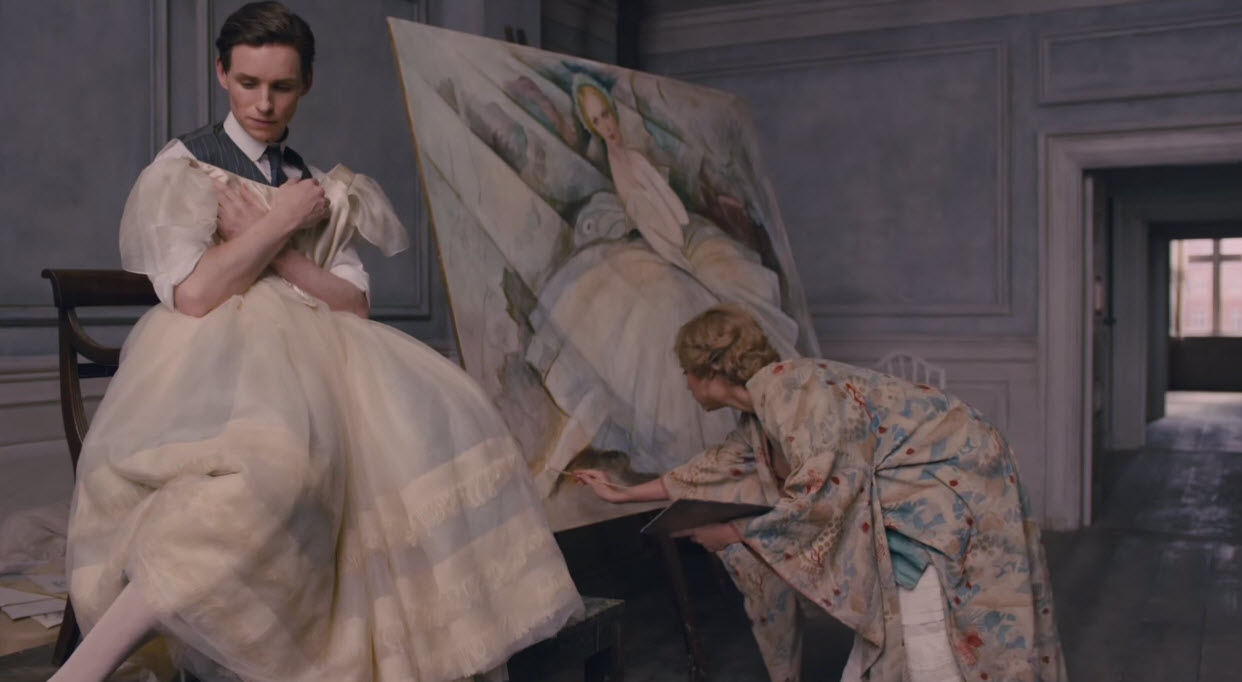
Here, in the bottom two, we finally penetrate the queer ghetto. The Danish Girl, based on a fictional book written by a gay cisgendered man, adapted by a straight cisgendered woman, directed by straight cisgendered man, and starring a straight cisgendered man, was doomed from the beginning to be an insensitive and inaccurate portrayal of one of the first people to undergo a series of operations for changing one’s gender. The final product is worse than imagined.
For decades, gay men dealt with movies that equated homosexuality as a sickness doomed to tragically kill us after we started tasting forbidden fruit. Though these films were usually well intentioned, trying to counter the “homosexuality is evil” message with a more sensitive “homosexuality is tragic” message, they nonetheless had such a presence that homosexuals became the doomed, tragic, wretched monsters of Hollywood meant to die nobly so audiences could feel their pain even as their neighbors were oppressing them in the park next door. With The Danish Girl, Hollywood is passing the tragic baton to the transgendered community. Now, unfortunately, they will have to deal with such cinematic statements of sensitivity and listen to the angry straight people who will inevitably say “well, if you didn’t like it, we won’t support you anymore.”
Tom Hooper and Eddie Redmayne co-opted the story of Lili Elbe (née Einar Wegener) and her wife Gerta Wegener to make a tale of tragic monstrosity. Transgendered identity is first identified with clothing fetishism, then with bodily illness, then with mental illness, and finally with tragic death. Despite managing to mark off each offensive cliche in the “movies about queer people” handbook, The Danish Girl is presented as a true and honest look at a real life human being, stoic and stolid in nature, primed to get all the awards for being a brave movie about a very current agenda. It’s that level of importance and self-importance that makes The Danish Girl all the worse.
1. Stonewall
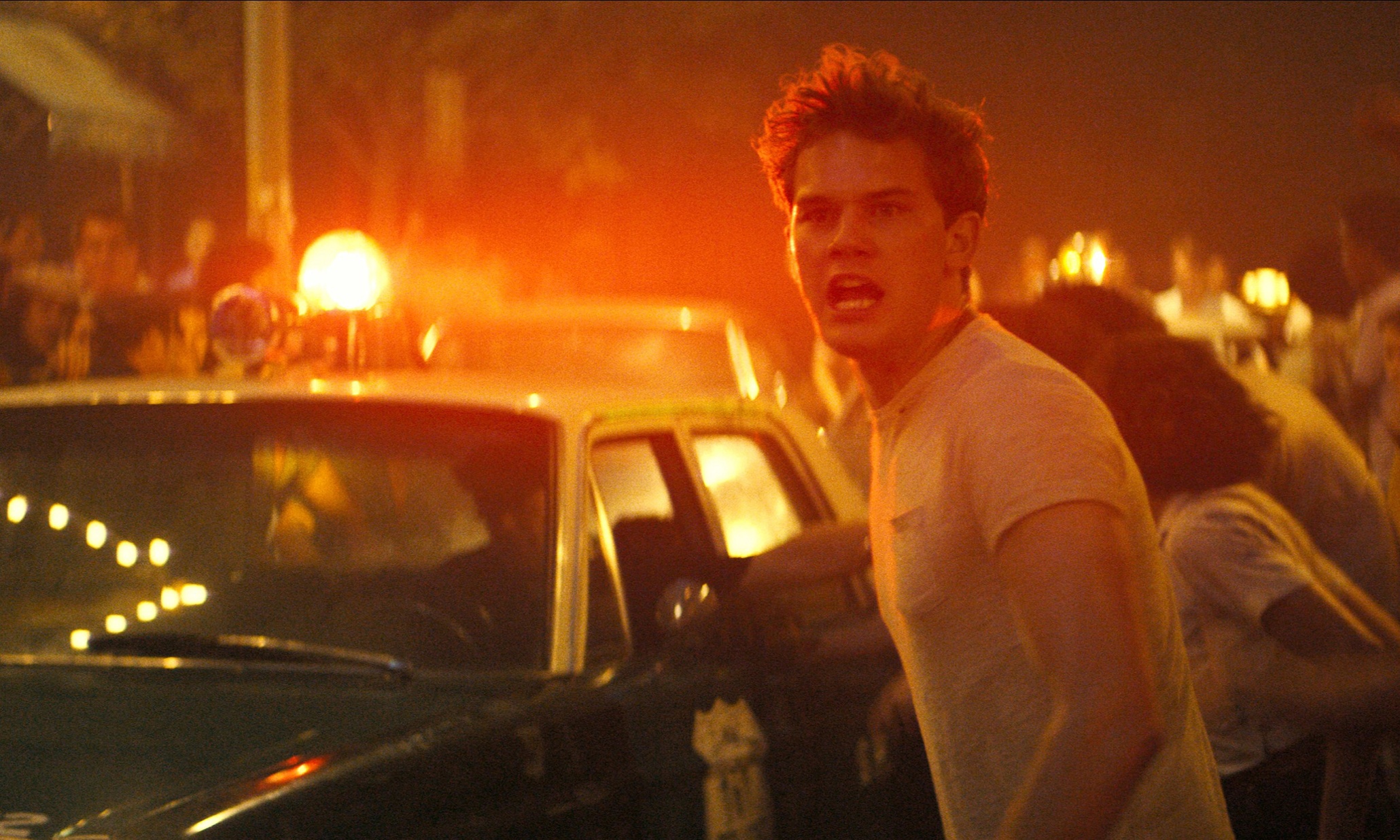
No movie of 2015 deserves more ire, more wrath, more vitriol this abortion of a movie. Made for $14m by an established director purporting to tell an important story about a watershed moment in queer history, Stonewall hits many of the same sore spots as The Danish Girl…but with one major exception: Stonewall is also a near incompetent movie.
Though Stonewall is ostensibly about the young multi-cultural group queer kids who made up the Christopher Street crowd and rioted after one too many police busts, director Roland Emmerich created a fictional white piece of twunk ass to hold the Middle American audience’s hand. By not only creating a white audience surrogate, but making him the center of the story, Emmerich is taking time away from the actual rioters and activists present at Stonewall. Emmerich devotes an unconscionably large amount of screen time to the backstory of the audience surrogate, while downplaying life in the streets, ignoring the hard knock life of a homeless kid, and missing the importance of the Stonewall Riots and its aftermath in the gay community. This would be forgivable if he had simply focused on the Riots themselves. Because Emmerich is is a disaster director who specializes in extended action sequences surrounded by movies with little character or plot, one might have expected a 100 minute riot sequence with no cultural grounding. Even then, he ignores his own strengths as he compresses an important three days and nights of rioting into maybe one night or 20 minute of screen time. With the final product, Emmerich all but ignores the real people that were present at the time, using one of the most galvanizing moments in gay history to tell a wishy-washy story of some white kid from the cornfields while browbeating middle America into accepting their gay children…so long as they happen to be white and hot.
The acting is bad (I really do love it when the twunk cries while getting a blowjob), the set design is bad, the cinematography is largely terrible, the music choices are hilariously misjudged, the screenplay is terrible, the direction doesn’t even play to its own strengths…nothing in Stonewall works. And, it’s offensive to boot. If we had to do a battle royale for worst movie of 2015 between Stonewall and The Cobbler (my worst film of the first half of 2015), Stonewall would easily win because it is so much more offensive, wasting an opportunity to have a decently budgeted movie about a watershed historical moment.
DisHonorable Mentions
Goosebumps for being such a waste of a promising premise
Guidance for being such a failure.
Our Brand is Crisis for being such a tone deaf piece of shit.
Spotlight for being boring, stodgy, self-important, obviously scripted, visually dull garbage with little to say.
Victoria for proving that editing is necessary, and for making me motion sick for no good reason
Final Ranking for 2015
10. Star Wars Episode VII: The Force Awakens
9. Unexpected
8. Big Stone Gap
7. Before We Go
6. Mortdecai
5. Manglehorn
4. Me and Earl and the Dying Girl
3. The Cobbler
2. The Danish Girl
1. Stonewall

